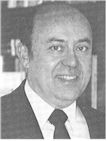Andrew J. Viterbi
- Birthdate
- 1935/03/09
- Birthplace
- Bergamo, Italy
- Awards
- IEEE Medal of Honor
Biography
Andrew J. Viterbi was born on 9 March 1935 in Bergamo, Italy. Arriving in the U.S. in 1939, he received the B.S. and M.S. degrees in Electrical Engineering in 1957 from MIT and the Ph.D. in Electrical Engineering in 1962 from the University of Southern California.
In his first employment after graduating from MIT,he was a member of the project team at CIT Jet Propulsion Laboratory which designed and implemented the telemetry equipment on the first successful U.S. satellite, Explorer I. In the early 1960s at the same laboratory, he was one of the first communication engineers to recognize the potential of, and analyze and propose digital transmission techniques for space and satellite telecommunication systems.
As a professor in the UCLA School of Engineering and Applied Science from 1963 to 1973, Viterbi conducted fundamental work in digital communication theory, and authored numerous research papers culminating in two books on the subject. The first, on phase coherent communication techniques, was the first comprehensive research monograph on the phase locked loop and its application to both tracking and demodulation. The second (jointly authored), on coding and information theory, contained the work for which he is best known: the Viterbi algorithm for maximum likelihood decoding of convolutional codes, which also found application in a host of other digital demodulation and processing applications. This concept has deeply affected information and communication theory, both for its tutorial elegance and for its applications to a broad class of communication problems.
The practical development of these theoretical principles led to the founding of LINKABIT Corporation, together with Dr. Irwin Jacobs. Viterbi was Executive Vice President of LINKABIT from 1974 to 1982. Since 1982, he has been President of M/A- COM LINKABIT, Inc.
Dr. Viterbi is a member of the U.S. National Academy of Engineering and a Fellow of IEEE. He is past Chairman of the Visiting Committee for the Electrical Engineering Department of Technion, Israel Institute of Technology, and he is presently a member of the MIT Corporation Visiting Committee for Electrical Engineering and Computer Science. He is also Chairman of U.S. Commission C of the International Radio Scientific Union (URSI) and a past member of the Army Science Board. He has been active at various times as a member or chairman of the Board of Governors of the IEEE Information Theory Group as its Transactions Associate Editor for coding. Since 1975, he has been Adjunct Professor of Electrical Engineering and Computer Science at the University of California, San Diego. Previous recognition includes three paper awards, culminating in the 1968 IEEE Information Theory Group Outstanding Paper Award. He has received two other major society awards: the 1975 Christopher Columbus International Award (from the Italian National Research Council, endowed by the City of Genoa); and jointly with Irwin Jacobs, the 1980 Aerospace Communications Award (from AIAA).
In spite of his current corporate administrative duties, he has managed to remain technically current, having recently proposed new spread spectrum processing techniques for jam resistant communication and for digital mobile radio. Andrew and his wife, Ema, have three children: Audrey, a doctoral candidate in the EECS Department at UC Berkeley; Alan, a Coro Foundation Fellow, pursuing a public policy graduate program; and Alexander, a seventh grader. As a family, they enjoy traveling together.
Dr. Viterbi won the 1984 IEEE Alexander Graham Bell Medal "For fundamental contributions to telecommunication theory and practice and for leadership in teaching," the 2007 IEEE/Royal Society of Edinburgh (RSE) Wolfson James Clerk Maxwell Award "For fundamental contributions, innovation, and leadership that enabled the growth of wireless telecommunications," and the 2010 IEEE Medal of Honor."
Interviews
An oral history interview with Dr. Viterbi is also available on the ETHW.
